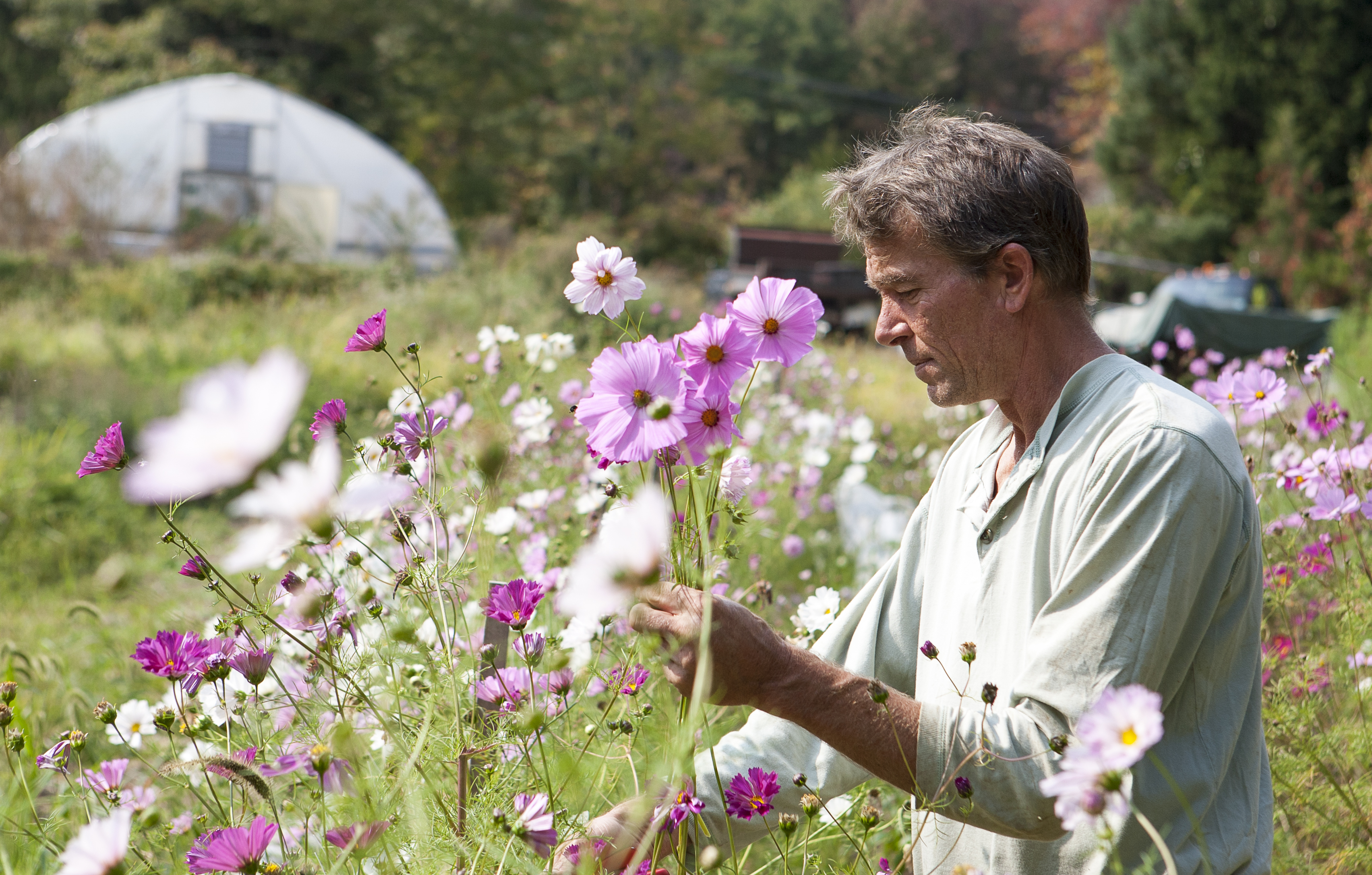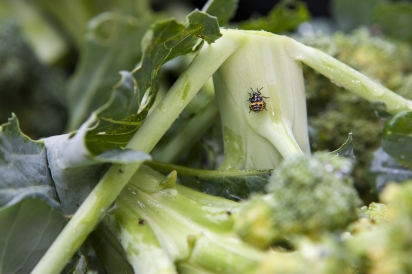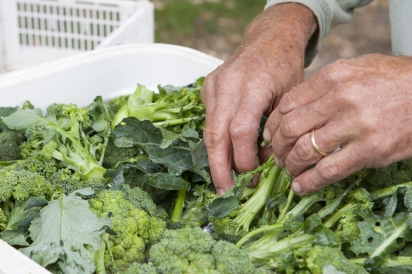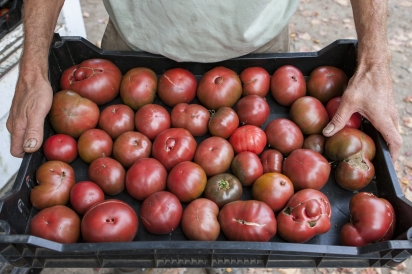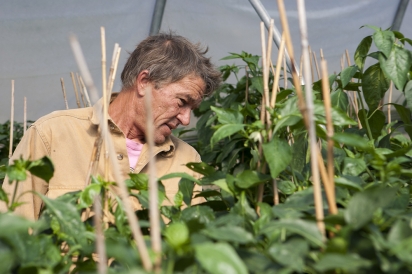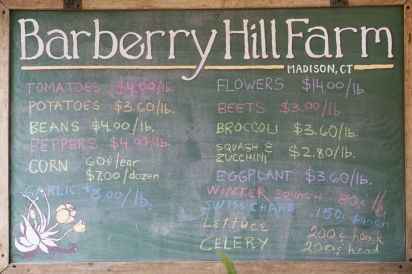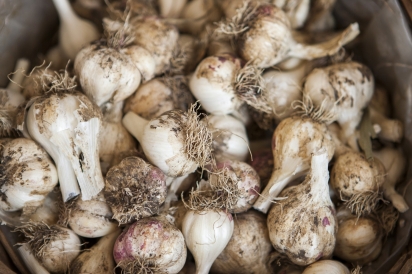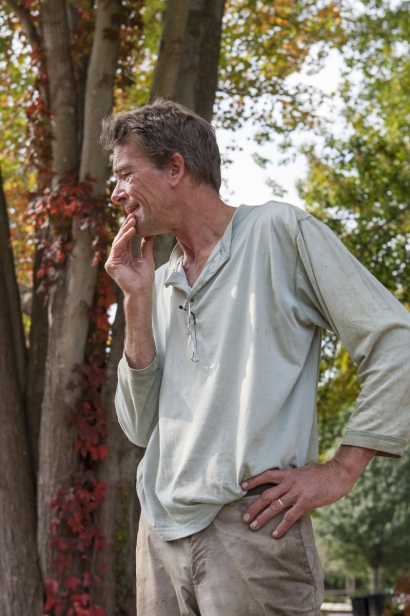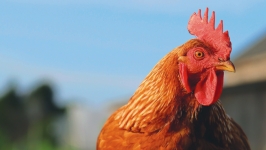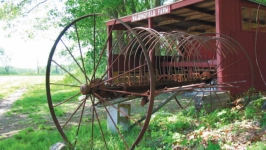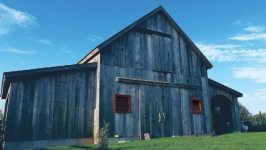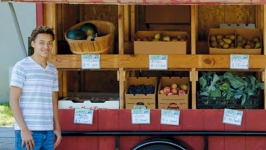Market Day at Barberry Hill Farm
It’s a Friday morning during harvest season, which means that it’s market day at Barberry Hill Farm in Madison, Connecticut. And Kingsley Goddard, who has been running this farm since 1987, is not happy. His broccoli is crawling with bugs. The vegetables are soaking in a cooler full of icy, salted water in the back of his beat-up, white pickup truck. Goddard hopes to drown the small caterpillars and beetles on his produce. But he’s pragmatic about the outcome: “I didn’t get skunked, you know?” he says. “I still got broccoli.”
Goddard, who turned 60 this year, is tall and lean, his skin rough and wrinkled from years in the field. He’s wearing a thick, collared shirt tucked into a pair of dirt-stained, heavy-duty pants with rolled-up cuffs, and an old pair of Crocs sandals. He knows that bugs are part of the price he pays for growing organically. A simple pesticide spray would easily vanquish these and many other pests at the farm. Instead, he opts for less toxic (if also less effective) remedies like table salt or baking powder. For him, there was never really a question that he would grow his crops organically; he knows how toxic pesticides are. “If you can't breathe it, and you can't touch it, it can't possibly be good,” he says. Plus, it’s hard to switch from conventional farming practices back to organic, since pesticides also kill beneficial insects that might keep the pests at bay.
Goddard grew up on this farm where he now raises his three children with his wife (and fellow farmer), Kelly. He has degrees in English and teaching but returned to the farm after a decade as a high school English teacher when his father died in 1987. His three siblings were eager to sell the farm and split the money, but Goddard saw the farm as a unique opportunity. “I didn’t want to lose the farm,” he says. “I figured I’d been handed this thing on a platter.”
Goddard doesn’t harbor any misconceptions about the challenges of farming life as he notes that the family’s income from the farm makes them eligible for food stamps. And Goddard doesn’t want his kids to become farmers. “I think they’re probably smarter than that,” he says as he waters pepper plants in one of his greenhouses. “If you’re gonna become a farmer, you’re gonna take a friggin’ vow of poverty, and you’re gonna work your buns off, or you’re gonna fail,” he says. “I like what I do, but yeah, I’m a disgruntled farmer,” Goddard admits.
But he also finds a deep satisfaction in his work and is clearly proud of the crops he raises, especially his tomatoes. “I grow the best effing tomatoes in the whole wide world,” he says. “And I know that.” Goddard mostly grows heirloom tomatoes, which he identifies as “trendy” in the same way that organic food was trendy in the late '80s. “Now, everybody’s like, ‘Oh, I want the heirloom! Is that an heirloom tomato?’” But he does recognize the value of heirlooms over the red, round, but largely flavorless varieties found in supermarkets or on larger farms. His tomatoes have deeply folded purple, green, and red skin. He picks one off the vine and bites into it like an apple.
Down at the corner of his property by Route 1, a white tent shelters the worn, wooden shelves full of squash, green beans, and tomatoes at Goddard’s farm stand. The stand is mostly self-serve, with an old, rusty scale and prices marked on a hanging chalkboard.
Other than the stand, most of the money the farm brings in comes from farmers markets and the farm shares that subscribers pay for at the beginning of each season. “All three of them still pull in enough to keep me in poverty,” he says. Goddard supplements the family’s income by plowing driveways in the winter; the farm also hosts several weddings every year.
As Goddard loads a large box truck with produce for that afternoon’s market, a car pulls into the makeshift driveway in front of the stand. Goddard is polite but curt with the couple that emerges. They admire the broccoli on display, and he warns them about the bugs. “Better bugs than pesticides,” the middle-aged woman responds. They buy a head of broccoli and some leafy celery. Goddard is impressed by her attitude, although he doesn’t say so until later. “Only a few people will see bugs on broccoli and still buy it,” he says.
Goddard moves the cooler full of broccoli into the box truck. Salty, cold water sloshes over the sides, drenching his pants. At this point, the broccoli has been soaking for several hours, but the bugs haven’t budged. Cupping a hand, Goddard scoops out some water and tastes it: maybe it’s not salty enough? “If I put much more salt in here, stuff’s gonna become petrified,” he says.
After lunch, Goddard and a farm hand load the remaining produce into the box truck, driving it down the road to the town green. There, other vendors are also setting up their tents and stands alongside the brick walkways. The eight other stalls at the farmers market today sell everything from vegetables to pies to fresh-caught fish.
Goddard and his helper cover the tables with tattered but clean sage-colored sheets and start laying out the vibrant display of colors and textures: smooth, fragile squash skin; satin finish on flower petals; papery, dry stalks of garlic bulbs; ceramic shells of eggs; taut skin of tomatoes (Goddard’s pride, front and center in three trays); and the soft broccoli florets.
Despite all Goddard’s efforts, the bugs on the broccoli remain. He tries to pick off a few more, but eventually gives up. Nestled in a basket, the heads of broccoli nevertheless look bright, fresh, and appetizing.
“Market’s open!” Goddard shouts. “Just throw money!” He laughs. “See, that’s why I shouldn’t work at the market.” Soon there’s a steady stream of buyers at the stall. One woman raves about the tomatoes’ colors. Another asks, “Are your vegetables genetically modified?” An older man asks if the broccoli is organic; assured that it is, he buys two heads. Goddard restocks the broccoli basket. “Worms! Fresh worms here!” he calls.
Goddard gets back in his pickup truck and drives back to the farm, leaving his helper to deal with the customers. He has to start prepping for tomorrow’s market. There are no days off on a farm; broccoli, tomatoes, and squash are ready when they’re ready, with no regard for weekends. The sheep and chickens also require continuous attention. But fortunately for the people who value local, organic produce, there are people like Goddard who work tirelessly to produce the incredible selection of food at the local farmers market every week. It’s a prize for which enduring a few harmless (if hardy) bugs seems worthwhile.
Barberry Hill Farm 353 Boston Post Rd., Madison, Connecticut 203-245-2373


